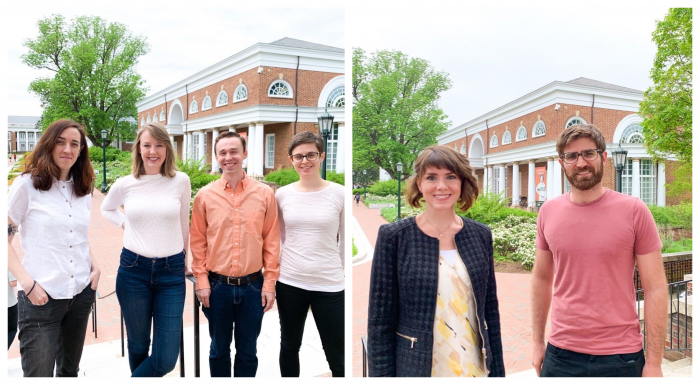Scholars' Lab: The Year in Review and the Year Ahead

Left: The 2019-2020 Praxis Fellows (from L to R) Natasha Roth-Rowland, Lauren Van Nest, Connor Kenaston, and Janet Dunkelbarger (not pictured: Chloe Down Wells); Right: The 2019-2020 DH Fellows (from L to R) Leigh Miller and Jordan Buysse
Scholars' Lab: The Year in Review and the Year Ahead
The COVID-19 crisis upended much of the spring 2020 semester at the University of Virginia, but the Scholars' Lab maintained its focus as the university's community lab for experimental scholarship while also directing its energies toward public needs in the face of a global pandemic. Here is a snapshot of Scholars' Lab activities from the semester past and a preview of the collaborations to come in the next academic year.
Praxis Fellows
The 2019-2020 cohort of Scholars’ Lab Praxis Fellows unveiled their DH project Land And Legacy, an investigation of the University of Virginia’s physical expansion over the last 40 years. The project reviews the growth of the university’s physical plant since 1980 in the context of the university’s branding and professed values while also examining the effects of UVA’s growth on surrounding communities. The 2019-2020 Praxis Fellows were as follows: Janet Dunkelbarger, Connor Kenaston, Natasha Roth-Rowland, Lauren Van Nest, and Chloe Down Wells. The Land and Legacy project can be explored in full here.
DH Fellows
The DH Fellowship, per the Scholars' Lab website, "supports advanced doctoral students doing innovative work in the digital humanities at the University of Virginia." Leigh Miller of the School of Architecture and Jordan Buysse of the English department (both of whom have since received their PhDs) presented the fruits of their year-long fellowships earlier this spring.
Buysse used grammar parsing algorithms, a text analytics method, to unearth patterns in Gertrude Stein's writings which deploy complex grammatical experiments. Combining traditional close reading with computational methods, Buysse produced a website that allows users to generate grammar diagrams of varying lengths. Buysse says that diagramming provides a line of sight into how Stein and her contemporaries were trained to approach composition in addition to providing "a better technical vocabulary for closely reading the mechanics of Steinese." DIagramming waned as a form of writing pedagogy in the 1960s, but automating the process as Buysse has done offers opportunities for human readers of texts to glean patterns in sentence structure and writing that might otherwise be missed. The demo for Buysse's Django-based grammar parsing tool is available here.
Miller's reseach focused on immersive ecologies in video games, examining the ways in which these virtual environments alter the player's relationship to space. She argues that through specific design choices, video games with immersive ecologies create a "field of possibility" in which mulitple experiences of time and material conditions become possible. She further suggests that through playing these video games, players enter a liminal ontological space in which they become both subject and object, creating "a back and forth flow of subjectivity," as Miller writes in her Scholars' Lab blog.
These games change our fundamental understandings of space, time, material conditions, and place at the same time that our understandings from the real world inform our movements and experiences of the virtual world in the game. Miller also worked with Scholars' Lab 3D Visualization Specialist Arin Bennett and 3D Data and Content Specialist Will Rourk to create virtual worlds that visualize and guide users through ideas Miller draws upon from architectural theory. See Miller's Scholars' Lab blog post for more information on the underpinnings of her research as a DH Fellow.
Cultural Heritage Informatics, Makerspace, and Manufacturing Masks
Unlimited Dimensions
Students participating in Scholars' Lab's Cultural Heritage Informatics Internship program recently launched Unlimited Dimensions, a website exploring the influence of the Italian Renaissance architect Andrea Palladio on Thomas Jefferson's architectural vision and design. Working under the supervision of Scholars' Lab 3D Data and Content Specialist Will Rourk, students drew upon data gathered from "Palladio's Villa La Rotonda" which received a 3Cavaliers Grant from the Office of the Vice President for Research in 2018. Together, Rourk and his interns produced 3D scans of Villa La Rotonda, the Academical Village, UVA's Rotunda, and Jefferson's personal retreat, Poplar Forest, assembled in a series of ArcGIS StoryMaps. Visit the Unlimited Dimensions site for more information.
Makerspace Masks
In addition to maintaining its full slate of programming for the spring 2020 semester, members of the Scholars' Lab put their skills to work in service of helping fill the PPE shortage that emerged in the United States during the early months of the COVID-19 pandemic. Instructions for 3D printing and sewing masks are available in this blog post from Scholars' Lab's Makerspace Technologists Nora Dale and Coke Matthews.
What’s Next
Scholars’ Lab recently announced its 2020-2021 cohorts for the Praxis and DH Fellowship programs. Congratulations to the following graduate students:
Praxis:
-
Grace Alvino, English
-
Emma Dove, Art and Architectural History
-
Elise Foote, English
-
Crystal Luo, History
-
Savanna Morrison, Music
-
Aaron Thompson, Slavic Languages and Literatures
DH Graduate Fellows:
-
Janet Dunkelbarger, Art and Architectural History
-
Michelle Morgenstern, Anthropology
More information about the selected graduate students and projects are available at the Scholars’ Lab blog.
